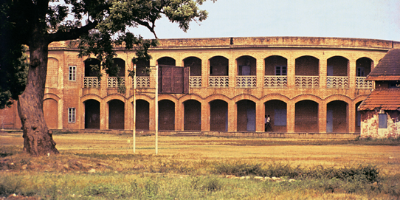1813-1854 : PERIOD OF EXPERIMENTS (16 Dez 1813 Jahr – 17 Apr 1854 Jahr)
Beschreibung:
The forty years between the Charter Act of 1813 and the Despatch of 1854 which forced the East India Company to accept the responsibilities of Education in India and an educational policy for India respectively, form second most important period in the history of education in India during British Rule. This period was mainly one of consolidation of British power in India. There was absence of educationalists to deal with the problems of Indian education.The educational problems of India in this period were handled by amateurs-the military and civil officers of the Company. Some Indians also played great role in building up the new educational system like Raja Ram Mohan Roy, Ishvarachandra Vidyasagar or Jagannath Shankarset participated in policy-drafting.
This period may be described as a period of controversies rather than of achievements. Points of controversy on the interpretation of charter act of 1813 and the national system of education and Macaulay’s role:
At that time a major oriental and occidental controversy was going on in respect of the following issues
1. Aim of education of the British policy: whether it should be to educate the classes in higher branches of learning or the masses in elementary education
2. Type of knowledge: whether to preserve and promote oriental learning or to introduce western knowledge, culture and science
3. Medium of instruction: whether English or Persian and Sanskrit in Bengal, English or Indian languages in Bombay and madras should become the medium of instruction
4. Agency of education: whether the government should assume direct responsibility of educating the Indians or the indigenous system of the country to continue
5. Missionaries: whether the shores of India to be thrown open to missionaries of all parts of the world to promote education or to a few missionaries or not at all.
In the early period, Orientalist dominated. In Bengal, There were debates about whether the EIC support oriental education or schools teaching English and Western knowledge. When Lord Macaulay became the president of the General Committee on public Instruction, he strongly pitched for Western Education. His Minute of 1835 and its endorsement by Governor General and utilitarian William Bentick in his minute, settled the debate in favour of English education.
Bengal also saw the emergence of middle class Intellectuals like Rajaram Mohan Roy, who became ardent supporters of Western education. They also became the first Indians to involve in modern Education in India.
This period also saw the debate over English v/s Vernacular education in Western India , in Bombay presidency. Mountstuart Elphinstone, governor of Bombay widely supported education societies in Bombay. Missionaries found education in vernacular language to be suitable to the native Indians.
References:
1. Ghosh, S. C (1995). The History of Education in Modern India, 1757-2012
2. Naik, J. P., & Nurullah, S. (1974). Students' history of education in India 1800-1973. MacMillan company of India limited.
Zugefügt zum Band der Zeit:
Datum:
16 Dez 1813 Jahr
17 Apr 1854 Jahr
~ 40 years
